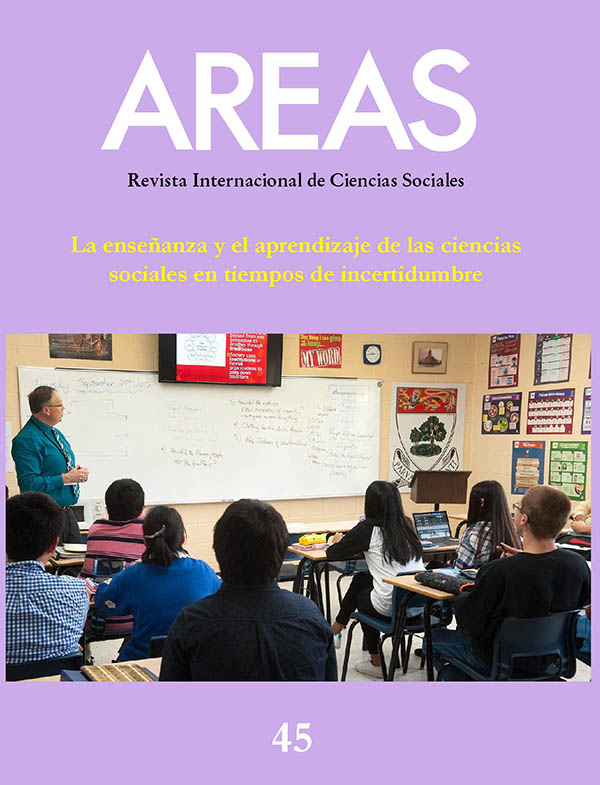Analysis of the perception of secondary master students about innovation and educational research in the teaching of history in secondary and baccalaureate education
Abstract
In this text we present the first phase of a study carried out among the students of the Master’s Degree in Compulsory Secondary Education Teachers and Baccalaureate, Vocational Training and Language Teaching, in the Geography and History Specialty, with the aim of analyzing their perception of research. and educational innovation and its influence on the teaching methodology and the planning of activities, through the end-of-module projects carried out by the students. As well as the challenge posed by such research and educational innovation from historical education and its influence on the development of professional skills.
Downloads
-
Abstract720
-
PDF (Español (España))432
-
HTML (Español (España))51
References
Berelson, B. (1952). Content Analysis. Handbook social psochology, tomo I.
Castellanos, B., Fernández, A. M., Llivina, M. J., Arencibia, V. y Hernández, R. (2005). Esquema conceptual, referencial y operativo sobre la investigación educativa. La Habana: Editora Pueblo y Educación.
Gairín, J. (2011) Prólogo. En Vázquez, M. I. Esquema conceptual, referencial y operativo sobre la investigación educativa. La Habana: Editora Pueblo y Educación.
Gómez, M.A. (2000). Análisis de contenido cualitativo y cuantitativo: definición, clasificación y metodología. Revista Ciencias Humanas, p. 20. https://revista.sangregorio.edu.ec/index.php/REVISTASANGREGORIO/article/view/113r
González, J. y Wagenaar, R (Eds.) (2006). Tuning Educational Structures in Europe II.
Informe final. La contribución de las universidades al Proceso de Bolonia. Publicaciones de la Universidad de Deusto. http://www.deusto-publicaciones.esdeusto/pdfs/tuning/tuning04.pd
Holsti, O.R. (1969). Content analysis for the social sciences and humanities. Addison-
Wesley
Krippendorff, K. (1990). Metodología de análisis de contenido. Teoría y Práctica. Madrid: Paidós.
López, F. (2002). El análisis de contenido cómo método de investigación. XXI. Revista de Educación, 2, 167-169.
Moreno, M. G. (2005). Potenciar la educación: un currículum transversal de formación
para la investigación. REICE. Revista Iberoamericana sobre Calidad, Eficacia y Cambio en Educación, 3 (1), 520-540.
Payà, M.; Escofet, A. y Rubio, L. (2019). El desarrollo de la competencia investigadora a través de los proyectos de aprendizaje-servicio. Codiseño y validación de una herramienta formativa para los futuros profesionales de la educación. Bordón, n 71 (3), 79-95. htttp://doi. 10.13042/Bordon.2019.68259
Pagés, T., Hernández, C., Abadia, A. R., Bueno, C., Ubieto, I., Márquez, D., Sabaté, S. y, Jorba, H. (2016). La innovación como competencia docente en la universidad: Innovación orientada a la mejora del aprendizaje. Aloma, 34(1), 33-43. https://ddd.uab.cat/record/170527.
Rodríguez-Gómez, D. y Gairín Sallán, J. (2015). Innovación, aprendizaje organizativo y gestión del cono cimiento en las instituciones educativas. Educación, XXIV, 46 73-90.
Ruiz, A. (2021). El contenido y su análisis. Enfoque y proceso. http://diposit.ub.edu/dspace/handle/2445/179232
Copyright (c) 2023 Areas. International Social Science Journal

This work is licensed under a Creative Commons Attribution-NonCommercial-NoDerivatives 3.0 Unported License.
The published works by this Journal are subject to the following terms:
1. The Publication Service of the University of Murcia (the Editor) owns the copyright of its publications. It promotes and allows its use under the indicated licence in Section 2.
© Servicio de Publicaciones, Universidad de Murcia, 2011
2. Papers are digitally published under the licence Creative Commons Reconocimiento-NoComercial-SinObraDerivada 3.0 España (legal text). They can be copied, used, disseminated, transferred and publically presented if: i) the author is quoted, as well as the original source of publication (Journal, editorial and URL); ii) they are not used for commercial purposes; iii) the licence of use is mentioned.
3. Auto-file Conditions. It is allowed and authors are encouraged to digitally disseminate their pre-print versions (versions prior to review) and/or post-print (reviewed version accepted for its publication) since it promotes its early diffusion and the corresponding increase of quotes and scope within the academic community. RoMEO Colour: green.


